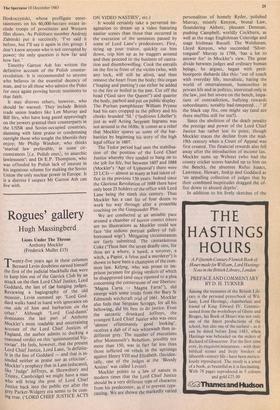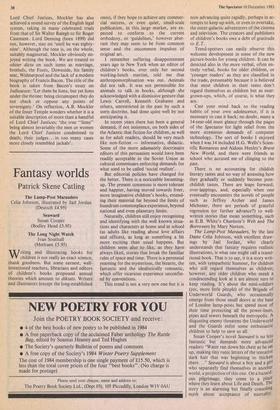Rogues' gallery
Hugh Massingberd
Lions Under The Throne Anthony Mockler (Frederick Muller £15) Twenty-five years ago in these columns
Bernard Levin doubtless earned himself the first of the judicial blackballs that were to keep him out of the Garrick Club by an attack on the then Lord Chief Justice, Lord Goddard, the last of Ole hanging judges. Reviewing a hagiography of the old monster, Levin summed up: 'Lord God- dard walks hand in hand with ignorance on one side of him and barbarism on the Other.' Although 'Lord God-damn' dominates the last part of Anthony Mockler's most readable and entertaining account of the Lord Chief Justices of England, the author admits to ducking a reasoned verdict on this 'quintessential Vic- torian'. He feels, however, that the present Lord Chief Justice, Lord Lane, 'is definite- ly in the line of Goddard — and that is in- tended neither as praise nor as criticism'. Mockler's prophecy that in Lane (educated, like 'Judge' Jeffreys, at Shrewsbury and Trinity, Cambridge) we might have a man Who will bring the post of Lord Chief Justice back into the public eye after the grey Parker-Widgery era seems to be com- ing true. ('LORD CHIEF JUSTICE ACTS
ON VIDEO NASTIES', etc.) .
It would certainly take a perverted im- agination to dream up a video featuring nastier scenes than those that occurred in the execution of the sentences passed by some of Lord Lane's predecessors. First, string up your traitor, quickly cut him down, trip him up as he staggers around and then proceed to the business of castra- tion and disembowelling. Cook the entrails on the fire in front of the victim (who, with any luck, will still be alive), and then remove the heart from the body; this organ ('leaping and panting') can either be added to the fire or boiled in the pan. Cut off the head ('God save the Queenr) and quarter the body, parboil and put on public display. The Puritan pamphleteer William Prynne had his ears cropped in the pillory and his cheeks branded `SL' ('Seditious Libellee); just as well Acting Sergeant Ingrams was not around in the 1630s. It comes as a relief that Mockler spares us some of the bar- barities by beginning his story of the high legal office in 1607.
The Tudor period had seen the stabilisa- tion of the position of the Lord Chief Justice whereby they tended to hang on to the job for life, but between 1607 and 1688 (Mockler's 'Age of Upheaval') there were 23 LCJs — almost as many as had taken of- fice in the previous 150 years. Indeed since the Glorious Revolution of 1688 there have only been 25 holders of the office with Lord Lane being the ninth this century. Thus Mockler has a cast list of four dozen to work his way through after a preamble touching on the Gunpowder Plot.
We are conducted at an amiable pace around a chamber of horror comics (there are no illustrations as Mockler could not face 'the tedious portrait gallery of full- bottomed wigs'). Mitigating circumstances are fairly submitted. The cantankerous Coke (`Thou hast the seven deadly sins, for thou art a whore, a bawd, a sorcerer, a witch, a Papist, a felon and a murderer') is shown to have been 'a champion of the com- mon law. Kelyng, who was prone to im- prison jurymen for giving verdicts of which he disapproved (and once riposted to a plea concerning the cornerstone of our liberties: 'Magna Carta — Magna Fartar), did emerge with some credit from the Bury St Edmunds witchcraft trial of 1661. Mockler also feels that Sergeant Scroggs, for all his bellowing, did his best to do justice. Even the sarcastic drunkard Jeffreys, the youngest Lord Chief Justice who was once 'almost effeminately good looking', receives a dab of if not whitewash then in- different grey. The number of executions after Monmouth's Rebellion, possibly not more than 150, was in fact far less than those inflicted on rebels in the uprisings against Henry VIII and Elizabeth. (Inciden- tally, one of the judges at the 'Bloody Assizes' was called Levinz).
Mockler points to a law of nature in modern times that the Lord Chief Justice should be a very different type of character from his predecessor, as if to prevent type- casting. We are shown the markedly varied personalities of homely Ryder, polished Murray, miserly Kenyon, brutal Law, floundering Abbott, pleasant Denman, pushing Campbell, worldly Cockburn, as well as the stage Englishman Coleridge and stage Irishman Russell, The Welshman, Lloyd Kenyon, who succeeded 'Silver- tongued' Murray in 1788, 'has a lot to answer for' in Mockler's view. The great divide between judges and ordinary human beings, he argues, began with petit- bourgeois diehards like this: 'out of touch with everyday life, moralistic, hating the world of entertainment, humourless in private life and in politics, interested only in the law, just but severe on the bench, impa- tient of contradiction, bullying towards subordinates, notably bad-tempered...' If the black cap fits, one might say (and are there muffins still for tea?).
Since the abolition of the death penalty the prestige and power of the Lord Chief Justice has rather lost its point, though Mockler traces the decline from the mid- 19th century when a Court of Appeal was first created. The financial rewards also fell away after the introduction of income tax. Mockler sums up Webster (who had the county cricket scores handed up to him on the Bench), the absentee Rufus Isaacs, Lawrence, Hewart, Inskip and Goddard as 'an appalling collection of judges that by their combined ineptitudes dragged the of- fice down to absurd depths'.
In addition to his lively sketches of the
Lord Chief Justices, Mockler has also achieved a sound survey of the English legal system, taking in many celebrated trials from that of Sir Walter Ralegh to Sir Roger Casement. Lord Denning (born 1899) did not, however, stay on 'until he was eighty- nine'. Although the tone is, on the whole, suitably magisterial, Mockler obviously en- joyed writing the book. We are treated to °biter dicta on such items as marriage, brothels, the Foots, Downside, his family seat, Widmerpool and the lack of a modern biography of Francis Bacon. The title of the book is taken from Bacon's essay on Judicature: 'Let them be lions, but yet lions under the throne: being circumspect they do not check or oppose any points of sovereignty.' On reflection, A.B. Mockler of the Inner Temple wonders whether it is a suitable description of more than a handful of Lord Chief Justices; 'the true "lions" being almost invariably the men or women the Lord Chief Justices condemned to death; their judges...in too many cases more closely resembled jackals'.















































 Previous page
Previous page